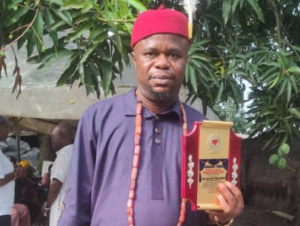Mike Ozehkome mourns Prof Ben Nwabueze.
11 min read
Introduction: The death, on Sunday, the 29th day of October, 2023, of Prof. Ben Nwabueze, SAN, brought to an end, arguably, the first generation of Senior Advocates of Nigeria. The first ever set of SANs in Nigeria comprised legal giants, Chief F.R.A. Williams and Dr. N.B. Graham-Douglass (both now late), who took the Silk on 4th March, 1975.

There was a three-year period of interregnum between 1975 and 1st of December, 1978, when this academic and legal colossus was silked with 12 other legal titans such as Chief Obafemi Awolowo, Chief Remi Fani-Kayode, Mr. T.A.Bankole-Oki, Mr E.A. Molajo, Mr. Kehinde Sofola, Chief Richard Akinjide, Mr. G.O.K. Ajayi, Mr. Olisa Chukwura, Dr. Nwakanma Okoro, Dr. Mudiga Odje, Mr. P.O. Balonwu and Dr. Augustin Nnamani. Nwabueze was certainly the first from the academia, based strictly on his published works. His first love was the classroom and he bestrode it like the colossus he was. He was thus justifiably called “the Professor of professors”. He remained a teacher and mentor of many generations of legal academics, both in Nigeria and beyond, till his last breath. I am one of his beneficiaries who compared notes with him and drank from his inexhaustible well of knowledge and wisdom.
Prof. Ben Nwabueze was born in Nigeria at a time when the country was under British colonial rule. He grew up in a society where opportunities for education were limited, especially for individuals from underprivileged backgrounds. Despite these challenges, young Ben’s unquenchable thirst for knowledge and insatiable curiosity served as the driving forces that would propel him towards academic greatness.
By his own account (“Ben Nwabueze: His Life, Works and Times: An Autobiography”, published by Gold Press, Ibadan, in 2013), Prof. Nwabueze was born in Atani, in the present Ogbaru Local Government of Anambra State, on the 22nd day of December, 1932. With such humble beginnings, there was little indication of the shining star that he was to become in the legal profession.
Education: Prof. Ben Nwabueze started his primary education at CMS Central School in his village of Atani, in Ogbaru LGA of Anambra State, between 1938 and 1945. Thereafter, he proceeded to CMS Central School, Onitsha, between 1947 and 1950. From 1956 to 1961, he attended the London School of Economics and Political Science, after which (between 1961 and 1962), he attended the School of Oriental and African Studies, London. It is important to point out that Prof. Nwabueze acquired most of his university qualifications on scholarships, which were awarded to him by sheer dint of his academic excellence.
Working life: Between 1962 and 1965, Prof. Nwabueze lectured at the Holborn College of Law, London. Upon his return to Nigeria, he took up appointment as a Senior Lecturer at the University of Nigeria, Nsukka (1967-1970), after which he once again left Nigeria – this time, to Zambia, first, as the dean of the Faculty of Law of the University of Zambia, and, subsequently, between 1973 and 1975, as the director of that country’s Law Practice Institute (the equivalent of our Law School).
Academic Recognition: Prof. Nwabueze’s recognition across the African continent gives the lie to the saying that a prophet has no honour in his homeland. This is because he was a member of the governing bodies (“the Senate”) of the Universities of Lesotho, Botswana, Swaziland, Haile Selassie (Ethiopia), Dar-es-Salam, not to mention University of Lagos, in his home country. In addition to this, he was also an assessor for academic appointments in the Universities of Ghana, Jos, Ife (now Obafemi Awolowo), and Lagos. He was appointed to professorial chairs in the Universities of Nigeria, Nsukka, Zambia, Anambra State University of Technology, Nnamdi Azikiwe University, and Ahmadu Bello University, Zaria. He later served, meritoriously, as the General Counsel of a first-generation bank, the United for Africa (UBA).
Dedication to legal scholarship: Prof. Nwabueze’s dedication to legal scholarship was unwavering. His contributions in the field of law were simply vast and varied. He authored numerous books and articles, each one a testament to his keen intellect and deep understanding of the subject matter he dealt with. His works on constitutional law, administrative law, and human rights law have become foundational texts for generations of law students, legal practitioners and members of the Bench.
One of his most influential works, “The Presidential Constitution of Nigeria,” delved into the complexities of Nigeria’s constitutional structure, drawing attention to issues of federalism, decentralization, and the balance of power. Nwabueze’s insights and recommendations have guided discussions on constitution reforms in Nigeria for decades, serving as a blueprint for the country’s path towards a more just and equitable society and governance structure.
In addition to his academic writings, Prof. Nwabueze was an active participant in legal reform and advocacy. He served on numerous government committees and panels, providing his expert input on various legal and constitutional issues. His contributions to the development of Nigeria’s legal system were not only profound but also instrumental in shaping the nation’s legal landscape.
Champion of constitutional reforms: Prof. Nwabueze was a tireless champion of constitutional reforms in Nigeria. He recognized that the country’s constitutional framework needed to evolve to better address the changing needs and aspirations of its diverse peoples. His passion for a more inclusive, equitable, egalitarian and just society was evident in his unrelenting pursuit of constitutional reforms.
Prof. Nwabueze’s advocacy for constitutional reforms often placed him in the role of a constitutional watchdog. He scrutinized proposed constitutional amendments and reforms, ensuring that the fundamental principles of justice, equity and democracy were upheld. He believed that a well-crafted constitution was the cornerstone of a just society, and he worked tirelessly to help Nigeria achieve this ideal state.
His role in the struggle for democracy in Nigeria during the military regimes of the 1980s and 1990s was instrumental to major changes. As an outspoken advocate for democratic governance and the rule of law, Prof. Nwabueze played a critical role in shaping the political landscape of the country. His unwavering commitment to democratic principles and his determination to see Nigeria transit to a democratic system were at the forefront of his endeavours.
In 1994, Nwabueze co-founded the Constitutional Rights Project (CRP), a non-governmental organization dedicated to the promotion of civil liberties, human rights, and the rule of law. The CRP became a powerful voice for justice and democracy in Nigeria, and Prof. Nwabueze’s leadership was a beacon of hope during some of the country’s darkest times.
Legacy in legal education While Prof. Nwabueze’s contributions to legal scholarship and constitutional reforms were immense and gargantuan, his impact on legal education was equally profound. He was not only a prolific writer, philosopher and thinker, but also a dedicated educator who inspired a generation of countless students throughout his career.
His teaching style was characterized by a commitment to intellectual rigor and a demand for excellence. Prof. Nwabueze believed in challenging his students to think critically and to develop a deep understanding of the law’s principles and applications. His teaching went beyond the classroom, it was a form of mentorship, instilling in his students a sense of responsibility to use their legal knowledge for the betterment of society.
Many of his former students have gone on to become accomplished lawyers, judges, academics and leaders in various fields of human endeavour. His influence was not limited to the confines of the classroom but extended to the very fabric of Nigerian society, where his students have played pivotal roles in shaping the legal, political and social landscape.
In recognition of his contributions to legal education, Nwabueze was honored with numerous awards and accolades. He served as a professor at various institutions, including the University of Nigeria, and the Nigerian Institute of Advanced Legal Studies. His impact on legal education was far-reaching, making him a pillar of the academic community.
In the first installment of this two-part eulogy, we sketched the origin of this legal sage: from his humble beginnings to his education, working life, academic laurels, his dedication to legal scholarship and his contributions to constitutional reforms and legal education.
In this concluding episode, we shall examine his passion for social justice, his personal and professional integrity, his visionary leadership, publications, court-room advocacy, his record of public service and his overall legacy and impact. Enjoy.
Advocate for social justice: Prof. Ben Nwabueze’s commitment to social justice extended beyond the legal realm. He was an advocate for equality, human rights, the rule of law and the well-being of all citizens. His involvement in social and political causes reflected his intense dedication to a more just and equitable society.
One of his notable contributions was his work in the area of human rights. Nwabueze was a behind-the-scenes voice in the founding of the Civil Liberties Organization (CLO) in Nigeria in 1987, an organization pioneered and co-founded by this writer and others, which is dedicated to the promotion and protection of civil liberties and human rights of Nigerians. Through CLO , he addressed issues of injustice, inequality, and abuse of power, standing up for the marginalized and oppressed.
Throughout his life, he demonstrated a deep concern for the less privileged and a commitment to improving their conditions. His advocacy efforts were not limited to the courtroom, but extended to the streets, where he actively participated in many protests and campaigns for social justice, especially during successive military juntas.
A life of integrity: Prof. Ben Nwabueze was a man of unblemished integrity and solid character. He held himself to the highest ethical standards and was a role model for those who had the privilege of knowing him or coming across him. His principled approach to life and work was a source of inspiration to many, and his actions consistently demonstrated his commitment to the greater good.
Nwabueze’s integrity extended to his role as a public servant. He was not swayed by political interests or personal gain but, rather, he focused on the welfare and interests of the Nigerian people. His honesty and steadfast dedication to the nation’s well-being earned him respect across political lines and within the international community. A visionary leader.
Prof. Nwabueze’s contributions to Nigeria went far beyond the confines of his academic and legal work. He was a visionary leader who sought to shape the nation’s future in a manner that reflected his deep commitment to justice, democracy, and the rule of law.
His vision for Nigeria was one of a united, democratic, and just nation where all citizens had equal opportunities and rights. He recognized the importance of inclusivity and the need for a more equitable distribution of resources and opportunities. His vision, which was rooted in the principles of federalism, constitutionalism, and respect for diversity, remains a source of inspiration for those who seek to build a better Nigeria.
Legacy and impact: The Oduah Afo-na-Isagba of Atani’s legacy is immeasurable. His impact on the Nigerian society, the legal community, and the broader field of constitutionalism transcends his lifetime. He will forever be remembered as a beacon of intellectual rigor, a tireless advocate for justice and democracy, and a role model for integrity and ethical conduct.
In the field of law, his contributions will continue to shape the education of future lawyers and Judges and the practice of legal professionals. His writings on constitutional law will remain foundational texts for scholars and practitioners, guiding the evolution of Africa and Nigeria’s constitutional framework for generations to come.
In the realm of constitutional reform, Nwabueze’s vision and advocacy will inspire future generations to work towards a more just, inclusive and equitable society. His passion for a united and democratic Nigeria will continue to influence those who strive for a better nation.
In the broader context of social justice and human rights, his works have left an indelible mark on the struggle for equality, social justice and the protection of civil liberties. His dedication to the welfare of the less privileged will serve as a lasting testament to the power of advocacy in effecting positive change.
Publications: The erudite scholar that he was, Prof. Nwabueze really came into his element in academic research. This saw him producing a prodigious wealth of scholarly works, including over thirty books and treatises with an average of 400 pages, on a diverse range of topics, albeit with a constitutional bent or flavor. He also authored over 200 articles in academic journals, as well as more than 100 keynote lectures in local and international conferences. Prof. Nwabueze’s seminal books on constitutional Law: Constitutionalism, Presidentialism, and Judicialism, earned him the prestigious (and rarely- awarded) distinction, in 1978, of being only the second Nigerian (after Dr. T.O. Elias) to be awarded the LL.D doctorate degree laurel, not honoris causa, but based on his solid academic works.
In the court : However, Prof. Nwabueze no less excelled in courtroom advocacy, as he was often consulted as amicus curiae by all levels of courts in Nigeria and beyond, particularly the apex Court. On each occasion, he was acknowledged and applauded for his profound and unique scholarly insights into the subject matter under discourse. Indeed, he was probably the foremost and pre-eminent living Senior Advocate of Nigeria of letters at his death.
Public service: Prof. Nwabueze’s recognition at home was arguably cemented by his appointment by the Babangida administration in the early 1990s, as the Minister of Education and Youth Development. This was in addition to being the Secretary-General (between 1978 and 1984) of the pre-eminent pan-Igbo cultural organization, Ohanaeze Ndigbo, an organization he co-founded in 1976 with prominent Igbo sons such as Dr. Akani Ibiam, Dr Michael Okpara, Dr K.O. Mbadiwe (the man of Timber and Caliber), Chief Ugochukwu, P.M. Okigbo and Chief Jerome Udoji.
The recipient of the prestigious CON national honour and the National Order of Merit (NNOM) was so concerned by the future of the Nigeria Project that, together with the late Chief F.R.A. Williams, SAN, he co-founded the Patriots, a group of eminent elders, who sought to enrich the public space with their advice and opinions when the ship of the Nigerian State sailed perilously and precariously into troubled waters in the wake of the annulment of the June 12, 1993 presidential election.
About a quarter of a century earlier, however, Prof. Nwabueze was reportedly behind the abolition of Nigeria’s historical Federal structure and its replacement by the government of Gen. Aguiyi-Ironsi, with a unitary system. He was said ro have been the silent adviser. This singular act was cited by the leaders of the July 1966 counter-coup as one of their main reasons for sacking Ironsi’s government which counter coup cost him his life. It is said that since then, Nigeria has never really recovered the Federal system of government that it hitherto enjoyed, being now replaced with an unofficial unitary system of government. Whether his alleged participation in the abolition of a federal template for Nigeria is correct or not is left for historians to unearth.
CONCLUSION : In conclusion, I dare say that the passing of Professor Ben Nwabueze is an irreplaceable and irreparable loss to Nigeria, Africa and the world. Arguably no Nigerian – living or dead – matched Prof. Nwabueze’s prodigious output in terms of scholarly legal and academic literature. In this, he was simply awesome. His contributions to legal scholarship, literature, constitutional reforms, education, egalitarianism and social justice were nothing short of extraordinary and phenomenal. His life was a testament to the power of intellect, character, integrity, and unwavering commitment to the betterment of society.
As we remember and celebrate his life and times, let us draw inspiration from his uncommon example. Let us continue the good works he started, striving for justice, human rights, democracy and the rule of law. In honoring his unforgettable memory, we celebrate the values and principles he held dear; and we commit ourselves to the noble pursuit of a better, more just and equitable world. Professor Ben Nwabueze’s legacy will endure as a beacon of hope and an eternal source of inspiration for generations to come. Indeed, an Iroko has fallen. His passage brings to a close an entire chapter of the legal profession. May his great soul rest in peace and in the bosom of the Lord. Amen, Adieu, my hero. Farewell, my guardian constitutional lawyer from whom I drew incredible inspiration. Goodbye, Africa’s foremost constitutional lawyer.
*Chief Ozekhome, a Senior Advocate of Nigeria (SAN), is a human rights advocate.




